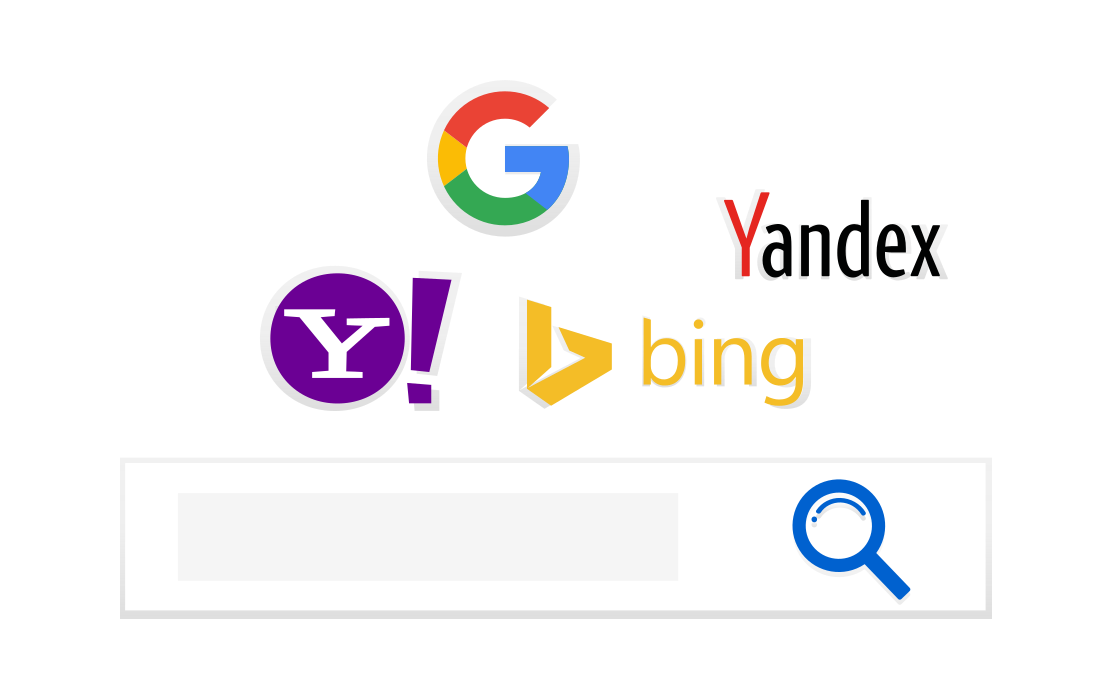Subtotal $0.00
For over two decades, Google has dominated the search engine landscape, becoming the default tool for everyday searches, product research, and news updates. Consequently, it has been the primary focus for SEO and digital marketing professionals.
Table of Contents
However, the landscape began shifting significantly with the advent of ChatGPT and Bing Chat. Reports indicated that Google’s founders, Larry Page and Sergey Brin, re-engaged with the company to accelerate the development of AI features for Google Search. This led to the launch of Bard (later rebranded as Gemini) in May 2023, followed by the rollout of “AI Overviews” in the US in May 2024. OpenAI responded by fully integrating web search into ChatGPT by late 2024, evolving the SearchGPT prototype.
Despite Google’s continued market dominance, a diverse array of alternative search engines has emerged, each offering distinct advantages such as enhanced privacy, specialized content, unique algorithms, or tailored user experiences. Here’s a look at 25 of the best alternatives currently available.
AI-Powered Search Engines: Intelligent Querying
These engines integrate large language models (LLMs) to provide conversational and synthesized answers. While powerful, they are susceptible to inaccuracies or “hallucinations.” Always verify critical information (medical, financial, legal) from authoritative sources.
- ChatGPT Search
- Traffic: ~3.9 billion monthly visits to domain.
- OpenAI’s fully integrated ChatGPT Search, launched in October 2024, evolved from the SearchGPT prototype. It combines live web data with AI to deliver answers supported by clear citations. Initially a paid feature, it is now freely accessible.
- Key Features: Follow-up questions, real-time web data, source citations, publisher control tools. Continuous improvements focus on context handling and citation accuracy.
- Google AI Mode
- Google’s latest AI search experiment, launched in early 2025, builds upon AI Overviews. It offers advanced reasoning and interactive conversation for complex queries.
- Key Features: Opt-in via Search Labs for Google One subscribers; supports follow-ups, deep exploration, conversation history, and text/voice interaction.
- Perplexity.ai
- Traffic: ~101.4 million monthly visits; ~14.1 million unique visitors (March 2025).
- Founded in 2022, Perplexity.ai functions as an AI chatbot providing direct, cited answers rather than traditional links. Its conversational approach allows for refining searches through follow-up questions.
- Note: LLM-based responses can sometimes be inaccurate.
- You.com
- Traffic: ~5.67 million monthly visits; ~1.56 million unique visitors (March 2025).
- Founded by NLP expert Richard Socher, You.com offers Personal and Private modes. Personal mode allows source customization, while Private mode ensures no telemetry data is recorded. Features include a Chrome extension and AI image generation, promoting an open search platform.
- Yep.com
- Traffic: ~162,300 monthly visits.
- Created by Ahrefs, Yep.com prioritizes user privacy, avoiding personal profiling for ads. Its unique 90/10 revenue model shares 90% of ad revenue directly with content creators, aiming to fairly compensate them.
Mainstream Alternatives: Established Players
These engines have maintained a consistent, albeit smaller, market share compared to Google.
- Bing.com
- Traffic: ~1.4 billion monthly visits.
- Microsoft’s Bing held 7.48% of the US search market (March 2025). It offers a Bing Rewards program and is noted for its strong visual search capabilities, particularly for videos without YouTube bias. The AI-powered “Copilot” (formerly Bing Chat) aims to provide deeper, generative search experiences.
- Performance Data: Use Bing Webmaster Tools (
webmaster.bing.com).
- Yahoo.com
- Traffic: ~3 billion monthly visits.
- With a 2.65% US market share (March 2025), Yahoo leverages Microsoft’s Bing technology for search. It offers a diversified platform including email, news, and finance.
- Performance Data: Track via Bing Webmaster Tools.
- Ecosia
- Traffic: ~186.8 million monthly visits.
- Ecosia is a certified B-Corporation that channels its advertising profits into environmental projects, primarily tree planting. It uses Bing’s search index and offers a browser extension.
- Performance Data: Track via Bing Webmaster Tools.
Privacy-Focused Search Engines: Your Data, Your Choice
These engines prioritize user anonymity by avoiding tracking and data collection.
- KARMA Search
- Traffic: 122,518+ monthly visits.
- Built on Brave’s anti-tracking tech, KARMA donates 100% of ad revenue to wildlife conservation. It provides clean, Bing-powered results and shortcuts to tools like Wolfram Alpha.
- Performance Data: Monitor
karmasearch.orgreferrals in analytics; use Bing Webmaster Tools for ad insights.
- DuckDuckGo
- Traffic: ~699.7 million monthly visits; 2.07% US market share (March 2025).
- DuckDuckGo’s core promise is privacy – no tracking, no profiling, no personalized ads or results. It aggregates results from various sources, including Bing.
- Performance Data: Check
duckduckgo.comreferrals in website analytics; indirect insights via Bing Webmaster Tools.
- Startpage
- Traffic: ~56.4 million monthly visits.
- A metasearch engine that fetches results from multiple sources (including Google, Bing) and prioritizes links appearing across them. Offers privacy features like a URL generator and proxy service.
- Performance Data: Analyze
startpage.comreferrals in website analytics.
- Swisscows
- Traffic: ~884,600 monthly visits.
- A family-friendly, semantic search engine using Bing for web results and maintaining its own German-language index. Emphasizes privacy and uses AI for contextual understanding.
- Performance Data: Review
swisscows.comreferrals in website analytics.
- Brave Search
- Traffic: ~284.3 million monthly visits.
- Brave Search operates on its own independent index (as of 2023), emphasizing privacy and transparency. Features include video calls, offline playlists, and advanced security options.
- Performance Data: Check
search.brave.comreferrals in website analytics.
- Kagi
- Traffic: Subscription-based (no public traffic stats).
- An ad-free, independent search engine running its own index (“Teclis”). Appeals to users seeking uncluttered results and offers customizable “Lenses” to filter content types (e.g., forums, academic papers).
- Performance Data: Monitor
kagi.comreferrals in analytics.
- Mojeek
- Traffic: ~647,100 monthly visits.
- A truly independent crawler (MojeekBot) that avoids reliance on Big Tech indexes. It prioritizes smaller sites and offers unbiased, non-personalized results.
- Performance Data: Track
mojeek.comreferrals in analytics.
Knowledge-Based & Specialized Search Engines: Targeted Discovery
These engines focus on specific types of content or knowledge formats.
- X (Formerly Twitter)
- Traffic: ~4.2 billion monthly visits.
- Unmatched for real-time updates and trending conversations. Essential for tracking breaking news or live events.
- Performance Data: Use X Analytics for account metrics and track
t.co/x.comreferrals in website analytics.
- SlideShare
- Traffic: ~47.2 million monthly visits.
- Ideal for searching presentations, ebooks, and PDFs. Useful for business research and content reuse.
- Performance Data: Access analytics via the SlideShare Creator Dashboard and track
slideshare.netreferrals.
- Wayback Machine (Internet Archive)
- Traffic: ~35.8 million monthly visits.
- A digital archive allowing users to view historical versions of websites and access a vast collection of books, videos, music, and software.
- Performance Data: Use the Wayback Machine interface to check how often your site has been archived.
- WolframAlpha
- Traffic: ~5.8 million monthly visits.
- A computational knowledge engine that calculates answers based on curated data across numerous disciplines. Offers Pro features for advanced analysis.
- Performance Data: Visibility primarily through citations or as a data source.
- LinkedIn
- Traffic: ~1.7 billion monthly visits.
- Functions as a professional search engine for people, companies, and industry insights. Its algorithm considers factors like profile/page name uniqueness, followers, and activity.
- Performance Data: Use LinkedIn Analytics for profile/page metrics and track
linkedin.comreferrals.
International Search Engines: Region-Specific Reach
These engines dominate specific geographic markets and offer localized results.
- Baidu
- Traffic: ~2.1 billion monthly visits.
- China’s leading search engine (51.45% market share). Offers integrated services like maps, music, and apps.
- Performance Data: Use Baidu Webmaster Tools (
ziyuan.baidu.com).
- Yandex
- Traffic: ~148.2 million monthly visits.
- Dominant in Russia (74.1%+ user share) and popular in neighboring countries. Offers a user-friendly interface and various tools.
- Performance Data: Use Yandex Webmaster Tools (
webmaster.yandex.com).
- Sogou
- Traffic: ~32.5 million monthly visits.
- A growing Chinese search engine (2.69% market share) known for integrating WeChat search and offering translation features.
- Performance Data: Use Sogou Webmaster Tools (
zhanzhang.sogou.com).
- Naver
- Traffic: ~1.5 billion monthly visits.
- South Korea’s top search engine (47.14% market share). Provides integrated services like blogs, news, and shopping.
- Performance Data: Use Naver Search Advisor (
searchadvisor.naver.com).
Summary Table: Search Engine Index Sources
| AI-Powered | ChatGPT Search | OpenAI (own technology) |
| Perplexity.ai | Own AI technology | |
| You.com | Microsoft Bing | |
| Revenue-Sharing | Yep.com | Own technology (by Ahrefs) |
| Copyright-Free | Openverse | Own index for open-source content |
| Mainstream | Bing | Microsoft (own technology) |
| Yahoo | Microsoft Bing | |
| Ecosia | Microsoft Bing | |
| Privacy-Focused | KARMA Search | Independent, based on Brave Search |
| DuckDuckGo | Multiple sources (incl. Microsoft Bing) | |
| Startpage | Google (with privacy layer) | |
| Swisscows | Microsoft Bing + own German index | |
| Brave Search | Own independent index (since 2023) | |
| Kagi | Own independent index (“Teclis”) | |
| Mojeek | Own crawler (MojeekBot) | |
| Knowledge-Based | X (Twitter) | Own technology |
| SlideShare | Own database | |
| Wayback Machine | Internet Archive (own technology) | |
| Specialized | WolframAlpha | Own computational knowledge engine |
| Own search algorithm | ||
| International | Baidu | Own technology (China) |
| Yandex | Own technology (Russia) | |
| Sogou | Own technology (China) | |
| Naver | Own technology (South Korea) |
Conclusion
While Google remains the most widely used search engine, it’s no longer the only viable option. Depending on your priorities – whether that’s leveraging cutting-edge AI, protecting your privacy, finding specialized content, or accessing region-specific information – one of these alternative search engines might offer a more suitable or preferable experience. Exploring these options can broaden your perspective and potentially yield better results for your specific needs.
FAQs
1. What is the most widely used search engine in the world?
Google dominates the global search engine market with over 90% share, making it the most used search engine worldwide.
2. Why should I care about search engines other than Google?
While Google holds the majority, search engines like Bing, Yahoo, and DuckDuckGo have loyal user bases and can drive additional traffic, especially in specific regions and industries.
3. Which search engine is best for privacy?
DuckDuckGo and Startpage are known for strong privacy protection. They don’t track user data or personalize search results based on history.
4. Is Baidu a good search engine for reaching Chinese users?
Yes, Baidu is the leading search engine in China and is essential for businesses targeting Chinese audiences.
5. How can businesses benefit from understanding different search engines?
Understanding various search engines helps businesses tailor SEO strategies for diverse audiences, platforms, and privacy-focused users—ultimately improving reach and visibility.







